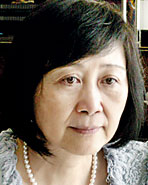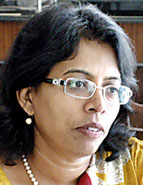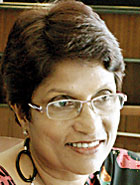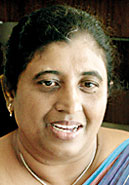Aye, aye mate!
View(s):As two young female graduates break new ground at the Sri Lanka Ports Authority Operational Division where till now women were
restricted to office activities, Namini Wijedasa reports on the challenges faced by Lankan women in transport and logistics- traditionally male-dominated areas
The Operations Division of the Sri Lanka Ports Authority—where the work doesn’t stop even for a moment—has traditionally been male territory. Employees toil to roster, day and night. Their presence is frequently required at the shipyard and they are expected to board vessels that keep arriving and departing, regardless of the hour. The few women that did find a place in the Division were limited to office activities like data entry.

Making waves: Rasanjali Kaumadi Samarakoon (right) and Sahani Ratnasiri
But now, two young women from the University of Moratuwa have been hired to the Planning Section of the SLPA’s Operations Division as Junior Managers (Terminal Systems). Not only are 28-year-old Rasanjali Kaumadi Samarakoon and Sahani Ratnasiri the first women to work there, they are from the University’s first batch of Transport and Logistics Management graduates. Just 12 out of the 52 graduates were women.
SLPA sources revealed that the management had initially been reluctant to break with tradition. “It is a 24-hour operation and it involves vessel planning,” said one official, requesting anonymity. “They were not sure women could handle it. But they went ahead and they are doing very well now.”
The Planning Section has stopped short of rostering Rasanjali and Sahani for night shifts. Unlike the men, who are expected to be available around the clock, they work from 7.30 a.m. to 4.30 p.m. But it is no less challenging. In order to support women like Rasanjali, the Chartered Institute of Transport and Logistics (CILT)—an international professional body representing transport and logistics industries worldwide—has launched a group called Women in Logistics and Transport (WiLAT). It was inaugurated at the CILT International Convention in Sri Lanka this month.
CILT itself has 33,000 members in over 31 countries. Its Sri Lankan chapter has over 1,300 members who are experts in transport and logistics. Only 130 of them are women. The incumbent international president of CILT is Dr. Dorothy Chan from Hong Kong. After graduating from university, Dr. Chan applied for a post in the Hong Kong Civil Service. She was posted to the Transport Department and found it so interesting that she spent 30 years there.
“It’s an interesting profession,” she told the Sunday Times. “As long as you can demonstrate your competence, your male partners are willing to work under you.” Dr. Chan said she was encouraged that Sri Lanka had a young population that was energetic, eager to learn and adaptive. As for WiLAT, its objective is to define measures to close the gender gap and to sustain women in working life.
Dr. Chan eventually rose to the position of Deputy Commissioner of Transport. It was the highest rank in Hong Kong for transport professionals. Yet, she had had to make many sacrifices.
“As a mother with two young children, I gave up a lot of overseas attachments and training,” she said. “But as a member of CILT, I was constantly updated on what was happening around the world. It’s even easier nowadays, with the internet.” Anoma Ranasinghe and Gayani de Alwis are senior transport and logistics professionals in the Sri Lankan private sector while Namali Siyambalapitiya holds high position in a related Government authority.
 CILT President Dr. Dorothy Chan |
 Gayani De Alwis |
 Anoma Ranasinghe |
 Namali Siymbalapitiya |
As General Manager of Documentation and Training in her shipping company, Anoma is familiar with late nights and early mornings. Many years ago, she applied for an opening in the shipping industry after completing her Chartered Secretaries and Administrators course.
“I thought it would be a good job for a woman,” she smiled. “After I joined, I realised that it was a male-dominated industry. But I came to this position within a span of 32 years.” Anoma handles import and export documentation and training. She also conducts lectures and is considered as one of the leading professionals in the field of shipping documentation.
“When one of our vessels is berthed, it is my department’s responsibility to ensure that the cargo is loaded and documentation completed, that the next ports of discharge are informed along with details of the cargo on board for discharge,” she said. “If there is a delay, the ship cannot berth at the next discharge port. When there are imports coming into Sri Lanka, I have to inform Customs and Ports in time or they will not be allowed to berth. There are penalties for all delays.”
Anoma says the industry needs professionals and that there are many opportunities for women. Yet, there are only a few of them entering the field. “Women are not willing to work late hours to finish targets,” she said. “Also, some companies don’t want to provide transport to women. The trend has been to recruit men. However, it is changing and there are women in my department who are willing to take up the challenges.”
Achieving a work-life balance is not easy. “When I started in shipping, my child was one-month-old,” Anoma said. “I had to leave the baby with my mother-in-law and a domestic aide to travel to Hong Kong for training. I have been balancing things for the last 32 years. My husband, an army officer, is supportive and helpful.”
“When you have males who are on par with you, you have to compete with them,” Anoma stressed. Gayani is a director at a multinational company and looks after the “supply chain”—ensuring that “products are delivered at the right time to the right place at the right price and quality”.
“Generally, awareness on logistics and transport among women is very low in this country,” she said. “The main reason is that they really don’t know whether this is a career for women. But once they know that opportunities are available at different levels in organisations and sectors, they will take this up as a career.”
Women are good negotiators, Gayani pointed out. They have strong communication skills and insight, can build teams, and are empathetic listeners. This makes them ideally suited to the field of logistics that involves warehousing; procurement; negotiating with suppliers and getting good products at the right price; demand forecasting; customer service; and managing goods movement.
“The supply chain is the backbone of any economy,” she emphasised. “Transport and logistics are like the veins and arteries of a body.”
What is the main challenge to women? Mainly the working hours, I must say, Gayani reflected. Women take time off to have kids. You actually have a career break during the maternity leave period and career progression will get hindered. But these days, companies such as mine allow people to work from home. And they can come back to the same role or a different one. There are flexible working hours and crèches, among other facilities.
“Or there is job sharing,” she continued. “If I cannot work five days a week, I share with another person. These are new things that are coming to this part of the world. You can work through Skype and manage relations on the internet.”
Namali is the Vice Chairperson of CILT Sri Lanka and co-Chair of WiLAT. She started her career as a civil engineer. “For the first ten years, I did only road constructions including project management and land transport-related infrastructure development activities,” she recounted. “Then I became a highways and transport planner with much wider experience.”
For three years, Namali was Director Planning of the National Transport Commission. “It was a turning point in my life,” she enthused. Under the Chairmanship of Prof. Amal Kumarage, a renowned transport and logistics expert, the NTC recruited 40 new graduates from different fields and moulded them towards professionalism in transport. Many of them were women.
“I have always performed my duties to the best of my ability,” Namali, a mother-of-two reflected. “My mother-in-law is a good woman who understood the problems of working women. She helped me a lot. My husband is also an engineer who is involved in a lot of activities.”
“As a young professional, if you lose your opportunities, it’s very difficult to catch up later,” she said. “Everything in life comes parallel. You are a young undergraduate, you get married, and you are a young professional. If you cannot handle all these things at the right time you lose something… either you can’t go up the ladder, you miss a promotion or you end up without children. Family support is essential to women performing well professionally.”
Namali does not work late at office, unless there’s a meeting, but she always takes work home and sometimes works past midnight. She has several engineers in her charge. She plans, formulates and monitors projects for her Authority and also conducts negotiations for foreign funding as well as highways and route planning.
“It’s a vast subject,” she admits. “My lady engineers perform very well. They concentrate fully on the task at hand and deliver on time. Their male counterparts try to do other things at the same time!”
Follow @timesonlinelk
comments powered by Disqus


